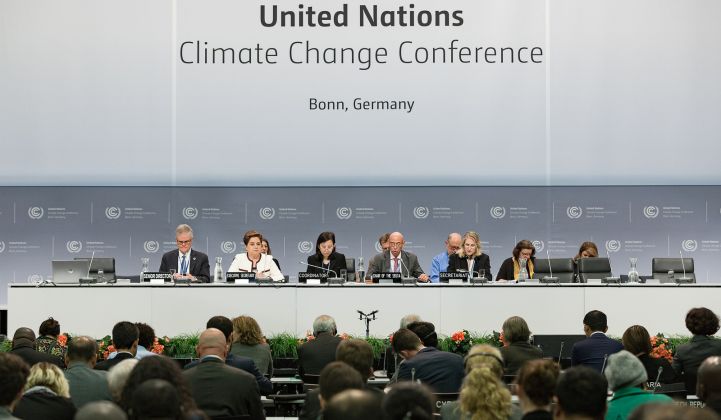The Trump administration has been getting hammered for restricting its participation in the United Nations climate conference in Bonn, Germany to advocating for “coal, gas and nuclear.” But like a broken clock that's right twice a day, the Trump administration did get something correct: Technologies like nuclear and carbon capture will be extremely important for limiting global warming to our 2 degree goal.
This fact has been acknowledged by the U.N. Intergovernmental Panel on Climate Change, the International Energy Agency, and a number of deep decarbonization analyses that include the Obama administration’s “Mid-Century Strategy.” The problem is that this underlying truth is completely obscured by the Trump administration’s misguided opposition to climate action, which ignores a preponderance of scientific evidence and defies logic.
Ultimately, the administration’s embrace of two sets of technologies that are critical to addressing climate change -- while at the same time denying climate change -- is dangerous to the future of nuclear, carbon capture, and the planet.
First, let’s acknowledge just how tone-deaf it is for the Trump team to preach to attendees about anything at the U.N. climate talks: Why should anyone buy the administration’s sales pitch for low-carbon technologies like nuclear and carbon capture when the president has been outspoken in his skepticism about climate change and whether we should be taking serious steps to avoid it?
Why should energy and environment ministers from around the world take suggestions on an emissions-reduction strategy from a country that appoints officials who believe carbon emissions are good for us and forms a team to attack climate science, rather than act on the clear consensus at which scientists have already arrived?
The answer is that U.S. officials cannot seriously hope to influence conversations around carbon capture -- the explicit purpose of which is reducing CO2 emissions -- when our government refuses to acknowledge emissions reduction as a worthwhile function. Even worse, U.S. leaders are (incorrectly) branding carbon capture as a way to prop up the American coal industry, which is in its death throes thanks to inexpensive natural gas and a public desire for cleaner air and water.
The administration’s efforts are also impeding very important conversations on the need for carbon capture to cut emissions on coal plants in the developing world, the need to deal with natural gas plants being constructed at a rapid clip, the need to address tricky emissions sources in the industrial sector, and to promote direct air capture and other negative emissions strategies.
Furthermore, promoting nuclear power while undermining renewables understandably makes supporters of wind and solar hostile to the idea of nuclear plants serving as a flexible, zero-emissions source of power that can cooperate with renewables and enable their growth on the grid. Hybrid energy systems of nuclear and renewables are feasible (and in some cases, optimal) ways to decarbonize. But it’s probably hard for wind and solar supporters to feel any sense of camaraderie when a pro-nuclear administration repeatedly attacks renewables in its rhetoric, its budget proposals, its appointments, and possibly its trade policy.
So where do we go from here?
It’s critical to the survival of the planet that we do not brand technologies that could be absolutely vital to cutting emissions with the mark of an administration so openly hostile to climate efforts. The Trump administration is not the only American voice in Bonn. Others there and in the U.S. are advocating for a broad set of solutions to our climate crisis. A growing, bipartisan coalition of leaders -- including climate hawks attending COP23 such as Senators Sheldon Whitehouse (D-RI) and Brian Schatz (D-HI) -- is advancing nuclear and carbon capture policies in Congress.
Some utilities are following a similar path. Exelon has worked with the Illinois and New York governments (and is pitching Pennsylvania) to extend the lives of nuclear power plants as part of these states’ climate efforts. Dominion cited the need for carbon-free energy in seeking to extend the licenses of two of its power plants in Virginia. The Midwestern utility AEP continues to develop its corporate strategy with the assumption that carbon will get regulated in the U.S. Its CEO, Nick Akins, was critical of the Trump administration’s announcement that it intended to withdraw the U.S. from the Paris Accord, saying “I think it's really important for us to stay engaged from an international community standpoint...and not withstanding that, we're continuing on our path of moving to a clean energy economy.”
Given that every low- and zero-emissions technology is critical to addressing climate change, we should welcome the Trump administration’s support for carbon capture and nuclear power. Context, however, is absolutely critical. Going to Bonn to promote “coal and nuclear” without acknowledging the urgent need to address climate change is not engaging in serious dialogue. It’s an enormous missed opportunity bordering on trolling.
If the United States is going to lead in advancing solutions -- including promoting domestic nuclear and carbon capture technologies -- we need an administration that recognizes the challenge we face.
***
Josh Freed is vice president for clean energy and Ryan Fitzpatrick is deputy director for clean energy at the Washington, D.C.-based public policy think tank Third Way.




